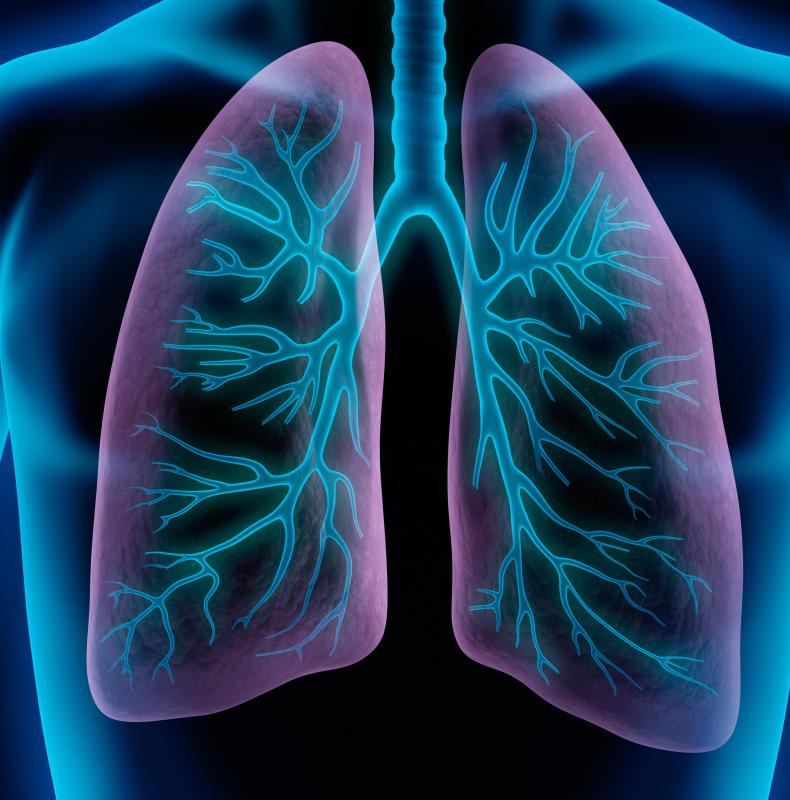At WiseGEEK, we're committed to delivering accurate, trustworthy information. Our expert-authored content is rigorously fact-checked and sourced from credible authorities. Discover how we uphold the highest standards in providing you with reliable knowledge.
What are the Risks of Pneumonia in the Elderly?
Pneumonia is a common illness that afflicts people worldwide. Complications largely depend upon one’s health prior to the illness. Pneumonia in the elderly is of particular concern because weak immune systems may further complicate the condition. The most serious side effects of pneumonia include bacteria in the bloodstream, acute respiratory distress syndrome, respiratory failure and pleural effusion. Other risks of pneumonia in the elderly include aggravation of underlying health conditions, such as chronic obstructive pulmonary disease, and collapsed lung.
Pneumonia is a respiratory condition in which one or both lungs become infected. Causes of the illness include bacteria, viruses, mycoplasma and fungi. The immune system is normally equipped to fight such organisms, but elderly persons often have pre-existing health conditions that complicate pneumonia. Community-acquired pneumonia, which spreads in nursing homes and hospitals, poses one of the most serious threats to the elderly.

Finding effective treatment is one obstacle with pneumonia in the elderly. Some medicines cannot be combined, while multiple medications may lead to stomach upset. Doctors also struggle to prescribe antibiotics because older persons typically cannot metabolize them well. Such instances may delay crucial treatment and increase the risk for complications.

Bacteria in the bloodstream is one of the most common complications of pneumonia. This happens when bacteria cells attack blood vessel walls. The pneumonia can then spread to other organs, including the brain and heart. In some cases, blood becomes overwhelmed by bacteria and leads to sepsis. This condition may be life-threatening and requires immediate medical attention.

Another possible effect of pneumonia on the lungs is acute respiratory distress syndrome (ARDS). ARDS occurs when fluid builds in air sacs of the lungs. The fluid prevents sufficient oxygen from passing into the bloodstream. This, in turn, can damage vital organs.
Respiratory failure occurs when mechanical changes to the lungs impede oxygen exchange. This is a common complication of ARDS, wherein fluid causes lungs to become stiff. Too much stiffness makes it impossible for a person to breathe, and arteries therefore lack oxygen. Persons with respiratory failure need mechanical ventilation to survive.

Pneumonia in the elderly may also cause pleural effusion. This is a condition in which fluid accumulates around the lungs. A thin membrane covers lungs and the inner surface of the chest wall. Pneumonia sometimes causes the membrane to become inflamed, and fluid can collect. This puts pressure on the lungs and makes it difficult to breathe.
Pneumonia can also aggravate pre-existing health conditions in elderly persons. This is especially true of community-acquired pneumonia. Those conditions of greatest concern include chronic obstructive pulmonary disease (COPD), coronary artery disease and congestive heart disease. These diseases become more pronounced when respiratory functions are reduced by pneumonia. They are sometimes referred to as comorbidities because they can be lethal when paired with pneumonia.

Some cases of pneumonia in the elderly can also cause the lungs to collapse. This happens when air leaks from inside the lung to the space between the lung and chest wall. That air can cause pressure, forcing a lung to collapse. Treatment of a collapsed lung requires air to be drawn from it, usually with a syringe or needle. The lung normally heals within several weeks, but may take longer in elderly persons, as their immune systems aren't typically strong.
AS FEATURED ON:
AS FEATURED ON:

















Discussion Comments
Death from the complications of pneumonia are sadly common in the elderly. Unfortunately, a lot of elderly fall victim to pneumonia and other illnesses out of sheer neglect. Got an elderly parent? Check on him or her regularly. Someone needs to keep an eye on them and that duty typically falls to family. Those who have that duty thrust upon them should take it seriously.
Post your comments